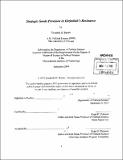Strategic goods provision in Hezbollah's resistance
Author(s)
Bartels, Elizabeth M. (Elizabeth Murphy)
DownloadFull printable version (5.431Mb)
Alternative title
study of Hezbollah's good provision
Other Contributors
Massachusetts Institute of Technology. Dept. of Political Science.
Advisor
Roger D. Petersen.
Terms of use
Metadata
Show full item recordAbstract
The provision of goods and services is thought to be a key way that groups are able to gain political power. However, current work has offered a highly fragmentary view of what specific gains can be made with what type of goods provision, and what potential interaction between strategies might exist. This paper integrates key rational actor and electoral models, and tests the resulting predictions against empirical data on Hezbollah's provision of goods and services. Two basic types of models link success in violent contestation to the provision of goods to a restricted community and success in electoral contestation to provision of broadly accessible goods and services. However, across several major types of goods and services Hezbollah consistently provided easily accessible good far before they considered participating in elections, provided more accessible goods relative to restricted goods then can be explained by the importance of electoral and violent contestation, and expanded or contracted the scope of provision at points in time that do not correspond to strategic shifts. As an alternative, I suggest that goods may be geographically rather than temporally strategic, a need to create compliance among the population, and the need to create a sense of agency within the Shia population to increase proactive support for the resistance may be greater drivers of goods provision then has been explored.
Description
Thesis (S.M.)--Massachusetts Institute of Technology, Dept. of Political Science, 2010. Cataloged from PDF version of thesis. Includes bibliographical references (p. 39-42).
Date issued
2010Department
Massachusetts Institute of Technology. Department of Political SciencePublisher
Massachusetts Institute of Technology
Keywords
Political Science.